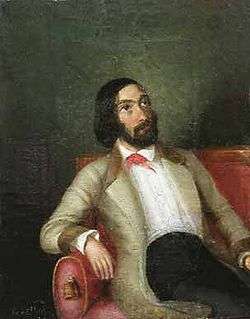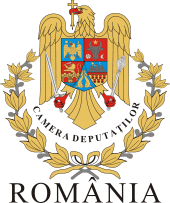C. A. Rosetti

Constantin Daniel Rosenthal

Constantin Alexandru Rosetti (Romanian pronunciation: [konstanˈtin alekˈsandru roˈseti]; 2 June 1816 – 8 April 1885) was a Romanian literary and political leader, born in Bucharest into the Rosetti family.
In 1845, Rosetti went to Paris, where he met Alphonse de Lamartine, the patron of the Society of Romanian Students in Paris. In 1847, he married Mary Grant, the sister of the English consul to Bucharest, Effingham Grant. The consul was married to Zoia Racoviţă, the daughter of Alexandru Racoviţă; the Grant Bridge (Podul Grant) near Gara de Nord in Bucharest is named after him.
Rosetti took part in the Wallachian Revolution of 1848. He was among the first arrested by Prince Gheorghe Bibescu, who accused Rosetti of plotting to kill him. After the provisional government came to power on 11 June 1848, he held the post of chief of police. He was also the editor of the first newspaper of the Muntenian revolution, Pruncul Român. He served with Nicolae Bălcescu, Alexandru G. Golescu and Ion C. Brătianu as a secretary of the Provisional Government until the end of June. In August, he was appointed director of the Ministry of the Interior.
After the bloody crushing of the revolution on 13 September 1848, Rosetti was arrested along with the other leaders of the revolution. His wife's intervention was crucial in their release. Rosetti, along with the Brătianu brothers, Bălcescu, and others, went into exile in France. While in France, he published a review favouring the creation of a national unitary state.
In 1861, he returned to Romania, and was elected deputy, and in 1866 was minister of public instruction. Between 15 and 16 July 1866, he was the temporary Prime Minister of Romania.
He supported the deposition of Alexander Ion Cuza in 1866. He headed the Chamber of Deputies in 1877, and was Minister of the Interior between 1881 and 1882.
A street (Strada C. A. Rosetti) and a square (Piața Rosetti) in central Bucharest are named after him, as well as a high school.
References
- "Rosetti, Constantin." The Columbia Encyclopedia, 6th ed. New York: Columbia University Press, 2001–04.
- C.A. Rosetti James Chastain, Encyclopedia of 1848 Revolutions
Further reading
- Vasile Netea, C. A. Rosetti (Bucureşti, 1970).
- Marin Bucur, C. A. Rosetti, Mesianism şi Donquijotism revoluţionar (Bucureşti, 1970).
